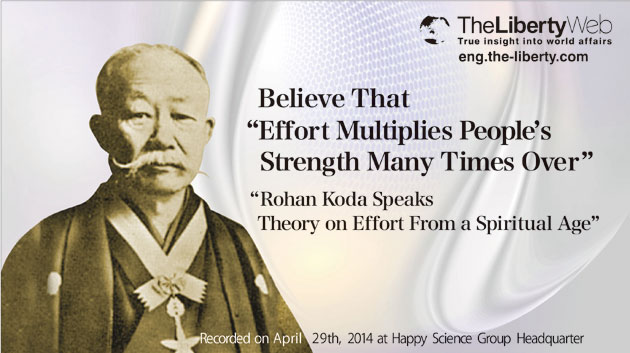Believe That “Effort Multiplies People’s Strength Many Times Over”
"Rohan Koda Speaks Theory On Effort From a Spiritual Age"
What are spiritual messages?
“Spiritual messages” is a phenomenon wherein the words belonging to spirits from the spiritual realm are channeled down. The ability for this belongs to those with a high level of enlightenment, and it is different from “psychic phenomenon” (the phenomenon where one loses consciousness and enters a trance, and the spirit alone talks). Further, in cases of non-Japanese spirits, it is possible to send spiritual messages by selecting words out of the spiritual medium’s native language, and thus have them understood in Japanese. For more information→ What is Master Okawa’s super spiritual power, “spiritual messages”?
Rohan Koda wrote the “Doryokuron” and the “Shuseiron”, and deeply influenced both his contemporaries as well as generations that followed. The spirit of Rohan who, through immense effort alone, overcame adversity and became a literary master representing his era, teaches us how to train one’s heart and the mental attitude needed for success.
The spirit of Rohan described “effort” as that which “increases the possibilities of life, perhaps not by infinite-fold, but certainly by hundreds, thousands, or hundreds of thousands times over”, but that many are unable to truly believe in the power of effort. During his life, Rohan expounded on the “Three ways to attain happiness,” which includes the “Sekifuku” (not using up one’s fortune), the “Bunpuku” (sharing one’s fortune), and the “Shokuhuku” (using fortune to invest for the future). In the spiritual message this time around he described in further detail on how to transform learning into wealth, on the difference between stinginess and Sekifuku, and the relation between effort and success.
He spoke on the spiritual essence of Shokuhuku, saying, “do it not for yourself, but so that the returns will benefit future generations, regions, the society, and the entire nation.”
Regard the Power of Others as “Something to Be Grateful For”
What supported the remarkable development of Japan since the Meiji Restoration can be described by Smiles’ “Self-Help,” Yukichi Fukuzawa’s “Gakumon no Susume,” and the ‘spirit of self-help’ inherited by the likes of Rohan Koda and Seiroku Honda. However, this line of thinking at times clashes with the idea of “the power of outside” wherein we receive the help of others or from God and Buddha.
The spirit of Rohan commented that “it is important to accept the ‘power of the other’ with gratitude”. The path to success is to, regardless of whether the circumstances are favorable or adversarial, accept what’s given to you as a positive, be grateful to God and Buddah, and follow the path of effort.
This spiritual message, which contains the essence of Rohan’s ideology of “self-help”, has the power to, once again, provide a lift to not only Japan but also the entire world.



















